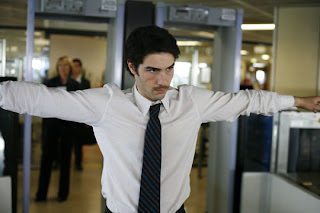A Single Man

Fashion designer Tom Ford adapts Christopher Isherwood's novel, 'A Single Man', into an impressive directorial debut. Of course, being a fashion designer, I guess he can't help creating something without thinking about how people are going to look in them. Anyway, the visual aspects of filmmaking take center stage here, as we are once again transported back to the early 1960's. This time, the setting is Los Angeles, and George has just awoken from what we can assume is another in what must be a long line of dreams about his dead lover. As pristine as his house is, and as coveted as his job as an English professor might be, everything around him is little more than a memory of the lost love of his life. Quietly, he decides this will be his last day on Earth.
Surrounding George's final day is a world holding it's breath over the Cuban Missile Crisis. A final and sudden lecture on living in fear inspires an eager (and ridiculously good-looking) young student who's suddenly desperate to open up to George. George's other interactions on his last day are pleasant enough. He flirts with a (ridiculously good-looking) Spanish hustler outside a market; he has a drunken heart to heart with his old friend, Charley (a ridiculously good-looking Julianna Moore); at her posh house across the street; he even hugs his maid (obviously for the first time). But for all his amiability, he's merely masking immense pain and dealing with constant reminders of his dead lover.
'A Single Man' owes a great debt to Wong Kar Wai's 'In The Mood For Love'. There's slow motion shots set to aching strings, dapper-looking men masking pain, stylish suits and dresses, and colors bleeding in every frame. This is where Ford succeeds most. His sense of not only framing, but color and costumes gives 'A Single Man' the kind of surreal theater that made Francis Ford Coppola's recent (and sadly over-looked) 'Tetro' such a pleasure. It's hard to take it all in without thinking of 'Zoolander', but it's even harder not to be affected by it.


